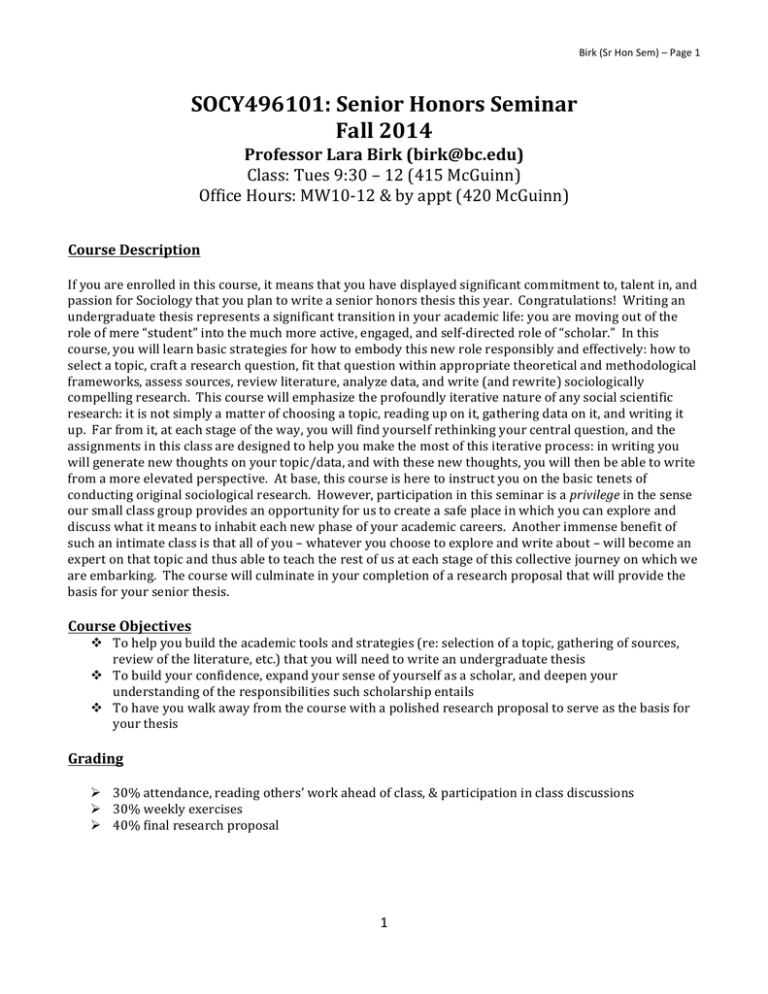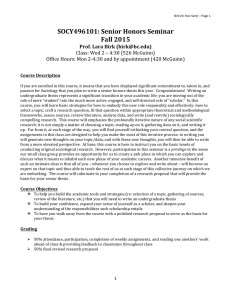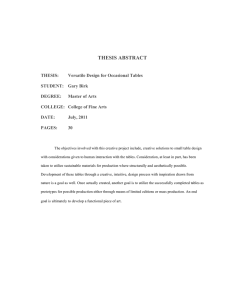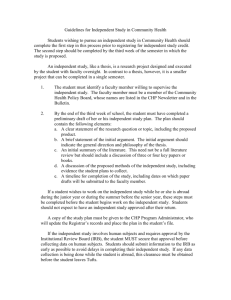Document 11324200
advertisement

Birk (Sr Hon Sem) – Page 1 SOCY496101: Senior Honors Seminar Fall 2014 Professor Lara Birk (birk@bc.edu) Class: Tues 9:30 – 12 (415 McGuinn) Office Hours: MW10-­‐12 & by appt (420 McGuinn) Course Description If you are enrolled in this course, it means that you have displayed significant commitment to, talent in, and passion for Sociology that you plan to write a senior honors thesis this year. Congratulations! Writing an undergraduate thesis represents a significant transition in your academic life: you are moving out of the role of mere “student” into the much more active, engaged, and self-­‐directed role of “scholar.” In this course, you will learn basic strategies for how to embody this new role responsibly and effectively: how to select a topic, craft a research question, fit that question within appropriate theoretical and methodological frameworks, assess sources, review literature, analyze data, and write (and rewrite) sociologically compelling research. This course will emphasize the profoundly iterative nature of any social scientific research: it is not simply a matter of choosing a topic, reading up on it, gathering data on it, and writing it up. Far from it, at each stage of the way, you will find yourself rethinking your central question, and the assignments in this class are designed to help you make the most of this iterative process: in writing you will generate new thoughts on your topic/data, and with these new thoughts, you will then be able to write from a more elevated perspective. At base, this course is here to instruct you on the basic tenets of conducting original sociological research. However, participation in this seminar is a privilege in the sense our small class group provides an opportunity for us to create a safe place in which you can explore and discuss what it means to inhabit each new phase of your academic careers. Another immense benefit of such an intimate class is that all of you – whatever you choose to explore and write about – will become an expert on that topic and thus able to teach the rest of us at each stage of this collective journey on which we are embarking. The course will culminate in your completion of a research proposal that will provide the basis for your senior thesis. Course Objectives To help you build the academic tools and strategies (re: selection of a topic, gathering of sources, review of the literature, etc.) that you will need to write an undergraduate thesis To build your confidence, expand your sense of yourself as a scholar, and deepen your understanding of the responsibilities such scholarship entails To have you walk away from the course with a polished research proposal to serve as the basis for your thesis Grading 30% attendance, reading others’ work ahead of class, & participation in class discussions 30% weekly exercises 40% final research proposal 1 Birk (Sr Hon Sem) – Page 2 Required Texts 1. How to Write a BA Thesis (2005) – Charles Lipson 2. Salsa Dancing into the Social Sciences (2008) – Kristin Luker 3. Additional Readings on course website Recommended Resources 1. 2. 3. 4. 5. 6. 7. 8. The Elements of Style 4th Edition (1999) – William Strunk & E.B. White The Craft of Research 3rd Edition (2008) – Wayne Booth, Gregory G. Colomb, and Joseph M. Williams Writing for Social Scientists (1986) – Howard S. Becker Developing Effective Research Proposals (2006) – Keith F. Punch Writing Literature Reviews 4th Edition (2009) – Jose L. Galvan Writing Empirical Research Reports 6th Edition (2007) – Fred Pyrczak and Randall R. Bruce Proposing Empirical Research (2000) – Mildred L. Patten BC Library’s Sociology Research Guide: http://libguides.bc.edu/sociologyportal Late Work Late work will NOT be accepted for the obvious reason that your weekly assignments are designed to keep you on track as you work toward completing a senior thesis. Moreover, if you have not completed an assignment ahead of class, you not only invalidate the usefulness of that class for yourself, but you also let down peers who are relying on your full participation and feedback during class time. Class Attendance Regular attendance is absolutely necessary to do well in this course, again for obvious reasons. I expect you to attend and participate fully in every single class session. If you anticipate missing a class for any reason, you should email me in advance to notify me of the reason for your absence. If there is an illness or family matter to which you need to attend, you must have the dean send me a notice about it if you expect to miss more than one class session. More than one unexcused absence will be noted and will significantly affect your grade in the course. Participation As mentioned above, this is a seminar, which means it is centered on not only class discussion but hands-­‐on exercises, and therefore I expect you to do the assigned readings before the class in which they are due and participate in class discussions and in-­‐class work on a regular basis. If you anticipate this will be a problem for you due to shyness or any other reason, please see me immediately. Students with Disabilities If you have a disability of any kind that you believe will impact your ability to perform academically, you must be registered with the Disability Services Office in Maloney Hall at 21 Campanella Way. Please notify me at the beginning of the semester if you have a documented disability and what sort of accommodations you will need in this course. 2 Birk (Sr Hon Sem) – Page 3 Campus Resources Connors Family Learning Center: O’Neill Library, 617-­‐552-­‐0611 Learning Resources for Student-­‐Athletes: Yawkey Athletic Center, 617-­‐552-­‐8533 Health Services: 119 Cushing Hall, 617-­‐552-­‐3225 or Emergency (24 hours) 617-­‐552-­‐3227 Counseling Services: 108 Gasson Hall, 617-­‐552-­‐3310 Disability Services Office: Maloney Hall, Suite 212, 617-­‐552-­‐3470 Women’s Resource Center: 213 McElroy, 617-­‐552-­‐3489 Sexual Assault Network: 617-­‐552-­‐BC11 BC Police Department: Emergency 617-­‐552-­‐4444, Non-­‐Emergency 617-­‐552-­‐3475 Academic Integrity In this and all Boston College courses, you are expected to present only your own work and ideas as your own. If you borrow the words or ideas of anyone else, whether an online source, a noted scholar in the field, or a classmate, you must accurately cite (and where necessary quote) that individual’s contributions. Engaging in cheating or plagiarism of any sort is a serious breach of the honor code implicit in the everyday operations of university life and a major violation of Boston College’s academic integrity policies. If I find you have been intellectually dishonest, you will be reported to the dean and penalized accordingly. For a full statement of BC’s policies on academic integrity, please see http://www.bc.edu/offices/stserv/academic/integrity.html. Assignments Sept. 2 – Introductions No Readings Sept. 9 – Exploring Topics READ: Luker, Ch. 1-­‐3 (pp. 1-­‐50) SKIM: Lipson, Section I (pp. 3-­‐34) DUE by 12 noon on SUNDAY 9/7: 1 page single-­‐spaced memo posted to course website (what research question(s) are you interested in exploring) DUE by class: prepare a short presentation (3 minutes) on your thesis topic; read one another’s memos and be prepared to discuss and provide peer feedback on them in class BEGIN: Brainstorm potential thesis advisors; familiarize yourself with BC’s Sociology Research Guide at http://libguides.bc.edu/sociologyportal Sept. 16 – Library Research TODAY’S CLASS WILL MEET IN O’NEILL 307 COMPUTER LAB with KATE SILFEN READ: Luker, Ch. 4 (pp. 76-­‐98) SKIM: Lipson, Ch. 3 (pp. 39-­‐65) and Ch. 15 and 16 (pp. 267-­‐281) DUE in class: Luker’s “daisy” exercise (this may be hand-­‐drawn or computer generated) BEGIN: Start reaching out to and scheduling appointments with potential advisors, and schedule an individual appointment with Kate Silfen 3 Birk (Sr Hon Sem) – Page 4 Sept. 23 – Framing Topics as Research Questions READ: Booth, Colomb, and Williams, Ch. 3 and 4 (pp. 35-­‐67) DUE by 12 noon on SUNDAY 9/21: Write a 1-­‐1.5 page single-­‐spaced memo refining your research question, situating it in a particular theoretical framework in sociology, explaining which pre-­‐existing scholarly conversation(s) your thesis will speak to, and engaging with the “So What?” question regarding your research DUE by class: read one another’s memos and be prepared to discuss and provide peer feedback on them in class Sept. 30 – Evaluating Research Literature READ: Galvan, Ch. 5 and 6 (pp. 43-­‐62) SPEAKER (Dr. Donnah Canavan) from IRB to come to class today to talk briefly about IRB in anticipation of your assignments for next week DUE by 12 noon on SUNDAY 9/28: Post an initial reference list of scholarly books and articles on your thesis topic (minimum 8 sources) DUE in class: Read 3 of your scholarly articles and write a 1-­‐1.5 page single-­‐spaced memo summarizing and critically evaluating the scholarship as well as reflecting on how it may further refine your research question BEGIN: Come to class prepared to discuss both your initial findings as well as your evolving ideas about your research; secure a faculty advisor by now if you have not already done so Oct. 7 – Methodological Approaches and Research Ethics READ: Luker, Ch. 6 and 7 (pp. 99-­‐154) DUE by class: IRB CITI (recommended) or NIH Training & Certification (bring printed certificate to class) at http://www.bc.edu/research/oric/human.html (links to tutorials on right side) DUE in class: Prepare a brief presentation (5 minutes) describing your anticipated research design: how you will operationalize your research question, what your sample will be, how you will find your data, and the reasoning behind your choices BEGIN: Look through what it will take to apply for IRB approval for your thesis project on their website, and review the Code of Ethics on ASA’s site: http://asanet.org/about/ethics.cfm Oct. 14 – Research Design READ: Lipson (pp. 73-­‐86); Ch. 5 and 7 (pp. 89-­‐98; 110-­‐119) DUE by noon on SUNDAY 10/12: Complete a full first draft of your IRB application as well as an extended bibliography (minimum: 12 sources) and post to the course website DUE by class: Prepare a brief presentation (5 minutes) reflecting on the ethics of your particular project and your responsibility as researcher; bring your informed consent forms and your advertisements/recruitment documents to class for peer feedback Oct. 21 – Theory READ: Find and read 3 articles approaching your topic from different (or even just slightly different) theoretical angles DUE by class: Revise and submit your IRB application to BC’s IRB online 4 Birk (Sr Hon Sem) – Page 5 DUE in class: Prepare a brief presentation (5 minutes) discussing different theoretical angles you could take vis-­‐à-­‐vis your research question and emphasizing the theoretical framework or frameworks (you can combine theories!) that hold(s) the most resonance for you (and perhaps reflecting on why) Oct. 28 – Literature Review READ: Find and critically read 3 literature reviews related to your thesis topic, including at least one from a peer-­‐reviewed journal (other sources: scholarly book or PhD dissertation). DUE by noon on SUNDAY 10/26: Write and post a 5 page literature review for your thesis DUE by class: Read the literature review of the person to whom you are assigned and come to class prepared to provide feedback Nov. 4 – The Research Process (Joys, Frustrations, etc.) NO READINGS DUE by class: Start gathering your data (do an interview, engage in ethnographic participation, conduct an online survey, etc.) IN-­‐CLASS: We will do an in-­‐class writing exercise reflecting on these first experiences conducting thesis research and how it influences our ever-­‐evolving thinking on our topic Nov. 11 – Obstacles & Strategies for Overcoming Them READ: Becker, Ch. 3 (pp. 43-­‐67) READ: Lipson, Ch. 13 and 14 (pp. 233-­‐263) DUE by noon on SUNDAY 11/9: Post a 1 paragraph description of any obstacle(s) you are encountering (be it vis-­‐à-­‐vis research, discipline, time management, organization, note-­‐ taking, procrastination, writer’s block, etc.), 1 paragraph on what you find you do well, and at least 1 tip or strategy you can share with your classmates on any of the above topics DUE in class: Read one another’s posts and prepare to discuss, provide support, and brainstorm concrete strategies for overcoming one another’s obstacles BEGIN: Continue reading and gathering data for your project; schedule upcoming appointment with your faculty advisor Nov. 18 – Data Analysis READ: Luker, Ch. 10 (pp. 198-­‐216) DUE by noon on SUNDAY 11/16: Post a 1 page single-­‐spaced memo to course website about your initial findings thus far (being sure to cite the literature where appropriate) DUE by class: read one another’s memos and be prepared to discuss and provide peer feedback on them in class BEGIN: Be sure to have another meeting with your advisor this week to discuss your progress; continue reading, gathering and analyzing data Nov. 25 – Writing as an Iterative Process NO READINGS DUE by class time: a full draft of your proposal and post to course website 5 Birk (Sr Hon Sem) – Page 6 Dec. 2 – Workshop NO READINGS DUE by class: Read the proposal of the classmate to whom you are assigned, just as they will read yours, and come prepared to workshop each other’s proposals during class time (i.e., provide and receive peer feedback) Dec. 9 – Workshop NO READINGS DUE by class: Read the proposal of the (different) classmate to whom you are assigned, just as they will read yours, and come prepared to workshop each other’s proposals during class time Dec. 16 – Final (Revised) Research Proposal Due 6


